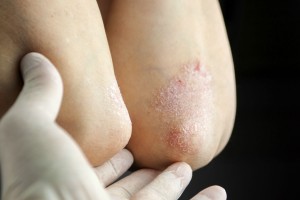Eczema, which affects thousands of New Zealanders, is characterized by red patches of itchy, dry broken skin driven by inflammation and is most common in people who suffer from allergies. Eczema can be brought on by a wide range of environmental triggers, including soaps and detergents, perfumes, clothing, jewelry, certain foods and even extremes of weather.
Ten new genetic links to eczema have been uncovered that could lead to greater understanding of the skin condition, as well as potential treatments. The research by a team of international scientists, including some at Trinity College Dublin, brings the total number of genetic variants linked to eczema to 31. In the biggest genetic investigation of eczema ever conducted, the team analyzed the DNA of 377,000 people participating in 40 research studies worldwide. The scientists used a technique called ‘genome-wide association analysis’ to look for small changes in the genetic code associated with higher rates of disease. All the genes involved play a role in regulating the immune system, they reported in the journal Nature Genetics.
They also found some evidence that the genetic make-up overlaps with other diseases like inflammatory bowel disease, which suggests studying these diseases together in the future could help researchers learn more about the role the immune system plays in certain illnesses. Genes can play an important role in determining how high the chances are that a person will develop eczema, but most of the genes that cause the condition have yet to be identified.”These new findings, gained through international collaboration with hundreds of thousands of patients in multiple countries show the importance of genes in both the immune system and the skin barrier in the causation of eczema,” said Dr Alan Irvine, Professor of Dermatology in the School of Medicine, at Trinity College Dublin.
Dr Lavinia Paternoster, from the Medical Research Council Integrative Epidemiology Unit at the University of Bristol, said: “Though the genetic variants identified in this current study represent only a small proportion of the risk for developing eczema, they do give new insights into important disease mechanisms and through on-going research in this area these findings could be turned into treatments of the future. “Co-author Dr Sara Brown, from the University of Dundee, said: “Eczema runs in families so we know that genetic factors are an important part of the cause.”The very large numbers of participants in this research has allowed us to ‘fine-tune’ our understanding of eczema genetic risk, providing more detail on how the skin immune system can go wrong in eczema.”
For more information please visit: www.tcd.ie


Comments are closed.